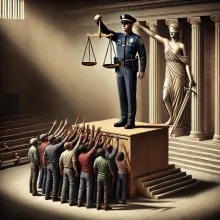The Peace Officers Bill of Rights (POBR) emerged in response to the unique pressures and challenges faced by law enforcement officers. The POBR was designed to ensure that officers are treated fairly during investigations and disciplinary proceedings, providing them with certain protections and rights that are similar to those afforded to other public employees.
The Fraternal Order of Police (FOP) is the largest police union in the United States and wields significant influence as a lobbyist organization. The FOP actively undermines due process, fair trials, and evidentiary standards by championing policies and practices that shield law enforcement officers from accountability.
Through its lobbying efforts, the FOP supported the Peace Officer Bill of Rights (POBR) and collective bargaining agreements that restrict the transparency of misconduct investigations, limit civilian oversight, and expand qualified immunity. These actions are viewed as prioritizing the protection of officers over ensuring that legal processes are equitable and that justice is fairly administered.





